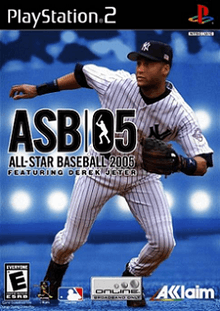All-Star Baseball
| All-Star Baseball | |
|---|---|
 Boxart of All-Star Baseball 2005, the final game in the series | |
| Genres | Sports |
| Developers | Iguana Entertainment/Acclaim Studios Austin |
| Publishers | Acclaim Entertainment/Acclaim Sports |
| Platforms | PlayStation, Sega Saturn, Nintendo 64, Game Boy Color, PlayStation 2, Xbox, GameCube, Game Boy Advance |
| Platform of origin | PlayStation, Sega Saturn |
| Year of inception | 1997 |
| First release |
All-Star Baseball '97 Featuring Frank Thomas June 30, 1997 |
| Latest release |
All-Star Baseball 2005 April 8, 2004 |
The All-Star Baseball baseball video game series was developed and published by Acclaim Entertainment. The series began in 1997 with the release of All-Star Baseball '97 Featuring Frank Thomas, the successor to Frank Thomas Big Hurt Baseball. New York Yankees play-by-play announcers John Sterling and Michael Kay were the announcers for 1998-2000 editions of the game. The final release in the series (due to the bankruptcy of Acclaim) is All-Star Baseball 2005.
Within the individual games, there are several different modes of play, such as exhibition, managing an existing Major League Baseball team or creating a team. Many North American cities are available for "expansion," in addition to Mexico City and Puerto Rico.
Most of the games feature Derek Jeter on the cover.
Series
| Title | Year | Platforms |
|---|---|---|
| All-Star Baseball '97 Featuring Frank Thomas | 1997 | PlayStation, Sega Saturn |
| All-Star Baseball '99 | 1998 | Nintendo 64, Game Boy |
| All-Star Baseball 2000 | 1999 | Nintendo 64, Game Boy Color |
| All-Star Baseball 2001 | 2000 | Nintendo 64, Game Boy Color |
| All-Star Baseball 2002 | 2001 | GameCube, PlayStation 2 |
| All-Star Baseball 2003 | 2002 | Xbox, GameCube, PlayStation 2, Game Boy Advance |
| All-Star Baseball 2004 | 2003 | Xbox, GameCube, PlayStation 2, Game Boy Advance |
| All-Star Baseball 2005 | 2004 | Xbox, PlayStation 2 |
1997
The first game in the series featured Frank Thomas and was released for the PlayStation and Sega Saturn.
1999
The game also marked the debut of play-by-play commentary. This is done by two New York Yankees broadcasters: John Sterling and Michael Kay. Larry Walker appeared on the game's box.
2005
All-Star Baseball 2005 features a variety of things that most previous versions did not include, such as classic players like Babe Ruth, Yogi Berra and others. Apart from each of the MLB teams, the game also features teams made up with legends of different eras and the 2004 American and National league teams. One particular game characteristic is that it includes the Montreal Expos, who relocated from Montreal to Washington D.C. and changed their name to the Washington Nationals for the 2005 MLB season.
The game includes all thirty stadiums as of the 2004 season, as well as other fictional and non-fictional ball parks to bring the total to over eighty parks. Some of these parks include: the Polo Grounds used by the then New York Giants (the New York Yankees played their home games there as well from 1913-1922); the Houston Astrodome; Hiram Bithorn Stadium used by the Montreal Expos in their final season; retro, current and future versions of Fenway Park, Yankee Stadium, Shea Stadium and Dodger Stadium.
Barry Bonds does not appear in All-Star Baseball 2005, because he is not a member of the Major League Baseball Players Association however Bonds is talked about by Brennaman and Lyons in an in-game conversation on why pitchers should not be allowed to win the MVP Award. Steve Lyons says, "You will never see Barry Bonds win the Cy Young Award." Instead, the San Francisco Giants have a fictional player named "Wes Mailman". "Mailman" actually announces himself on one of the billboards at the Philadelphia Phillies home games. The game does feature play by play commentary by Arizona Diamondbacks television broadcaster Thom Brennaman and former major league player Steve Lyons, who sometimes offers long answers to Brennaman's questions during games.
Derek Jeter is the featured player of this game's incarnation.
Receptions
The Nintendo 64 versions received positive reviews, with an average score in the mid-to-high eighties according to Gamerankings. However, the handheld versions of the game typically received lower scores than their console counterparts. With the sixth generation of consoles the series started to receive lower reviews. The Gamecube version of All-Star Baseball 2002 received the lowest reviews of all the home console games in the series, with an average score of 67%. All-Star Baseball 2000 on the Game Boy Color has the lowest scores of the entire series, at 60%. All-Star Baseball 2000 and 2001 are the highest ranked in the series, with scores of 88% and 87% respectively.